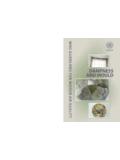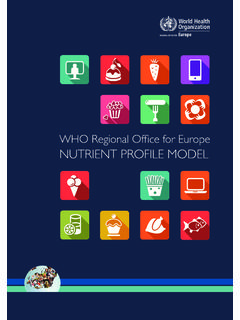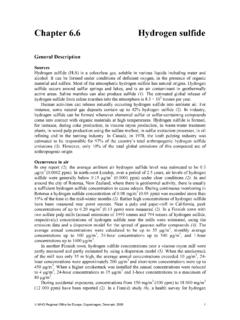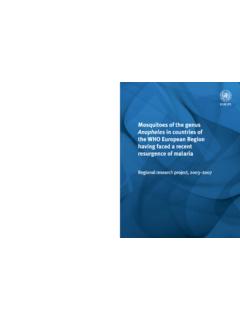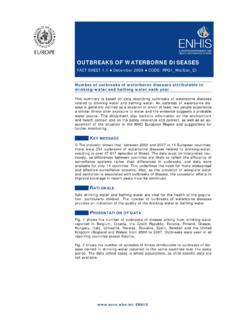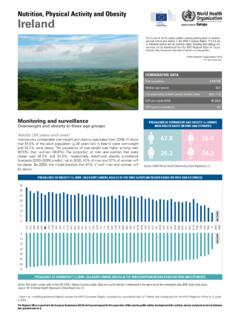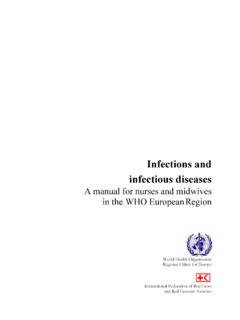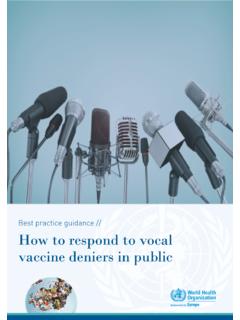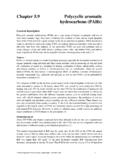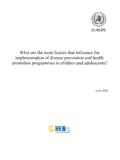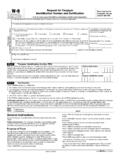Transcription of Monitoring knowledge, risk perceptions, preventive 29 …
1 SURVEY TOOL AND GUIDANCE Rapid, simple, flexible behavioural insights on COVID-19 Monitoring knowledge , risk perceptions , preventive behaviours and trust to inform pandemic outbreak response 29 July 2020 1 Address requests about publications of the WHO Regional Office for Europe to: Publications WHO Regional Office for Europe UN City, Marmorvej 51 DK-2100 Copenhagen , Denmark Alternatively, complete an online request form for documentation, health information, or for permission to quote or translate, on the Regional Office website ( ). World Health Organization 2020 All rights reserved. The Regional Office for Europe of the World Health Organization welcomes requests for permission to reproduce or translate its publications, in part or in full. The designations employed and the presentation of the material in this publication do not imply the expression of any opinion whatsoever on the part of the World Health Organization concerning the legal status of any country, territory, city or area or of its authorities, or concerning the delimitation of its frontiers or boundaries.
2 Dotted lines on maps represent approximate border lines for which there may not yet be full agreement. The mention of specific companies or of certain manufacturers products does not imply that they are endorsed or recommended by the World Health Organization in preference to others of a similar nature that are not mentioned. Errors and omissions excepted, the names of proprietary products are distinguished by initial capital letters. All reasonable precautions have been taken by the World Health Organization to verify the information contained in this publication. However, the published material is being distributed without warranty of any kind, either express or implied. The responsibility for the interpretation and use of the material lies with the reader. In no event shall the World Health Organization be liable for damages arising from its use.
3 The views expressed by authors, editors, or expert groups do not necessarily represent the decisions or the stated policy of the World Health Organization. Photo: WHO/Jonathan Schoeps Document number: WHO/EURO:2020-696-40431-542222 1. Introduction This document provides guidance to Member States in the WHO European Region that wish to conduct behavioural insights studies related to COVID-19. The COVID-19 pandemic outbreak is placing an overwhelming burden on health systems and authorities to respond with effective and appropriate interventions, policies and messages. A poorly timed and managed pandemic response or transition phase can threaten the gains collectively achieved. The pandemic and its restrictions may have affected mental and physical well-being, social cohesion, economic stability as well as individual and community resilience and trust (1-5).
4 In this complex context, understanding how, why and the context in which humans and communities respond allows to 1) anticipate unwanted scenarios and initiate mitigating measures; and 2) implement pandemic response measures that are better informed, situated, accepted and thus more effective. Population surveys can explore perceptions , acceptance of restrictions, mental and physical health, behaviours, information needs, misperceptions and more. WHO Regional Office for Europe and partners are offering Member States a tool to gain such insights which 1) is evidence-informed; 2) can be regularly applied; 3) is flexible to adjust to the changing situation; 4) follows high ethical standards. A few countries have rapidly instigated studies to gain such insights, and more countries are urged to prioritize such efforts to inform and support other response measures.
5 The approach presented in this guidance document was developed based on a framework initiated by the University of Erfurt, Germany, German national health authorities and others (Box 3). This guidance document introduces: guidance on the recommended process and steps a sample methodology advice for obtaining ethical clearance a suggested sample questionnaire (Annex 1) codes for data analysis and establishing a protected website for presentation of findings (Annex 2). WHO Europe s Insights Unit and Health Emergencies Programme are offering support to countries for implementation. We urge all users of the tool to let us know their plans so that we can coordinate and share. This way, we can prevent that two institutions in one country are working in parallel on the same type of study.
6 Please contact Katrine Bach Habersaat or Martha Scherzer 3 Box 1: Suggested approach to behavioural insights research for COVID-19 Any country interested may use the questionnaire (Annex 1) to collect data regarding the public s risk perceptions , behaviours, trust, knowledge and other variables. This data is collected via online panels, and a national research group or private company can be engaged to collect the data. Using a set of codes (Annex 2) the findings can be automatically and immediately transferred to a protected webpage, if desired (examples of what this looks like in Figure 1). The webpage can be easily developed as a subpage on an existing website as decided by the implementing country. This allows national pandemic response groups to use the findings to inform pandemic response measures.
7 In more detail: It is suggested to conduct a serial, cross-sectional study: Data can be collected repeatedly, weekly, with different participants so the status quo can be assessed over time. Repeated assessment of the same core variables allows analyzing changes over time. It also allows comparisons across countries if desired. Changing some variables allows adaptive research to a dynamic situation ( asking for the acceptance of hand washing may be more important in the beginning while adding acceptance of closing schools or a lockdown may be relevant later in the epidemic). This allows in-time and adaptive Monitoring of the variables (such as risk perceptions , knowledge , trust, behaviours and more) and identifying changes over time to assess the relations between them.
8 Variables can be adapted to different countries, target groups, cultural contexts and to the evolving situation and epidemiology over time. Randomization of answer options can be made where suitable. An automated data analysis website ensures immediate data analysis and provides fast access to the results (commented code for data analysis and website in Annex 2). Changes in risk perceptions or knowledge can be assessed over time. Data on acceptance of new response measures can be made rapidly available. Emerging issues, related to stigma can be identified as they emerge. National teams using the tool are urged to work in partner coalitions to discuss insights gained and implications for outbreak response interventions, policies and messages. Results can be made available to the media to support high quality and responsible reporting.
9 4 Box 2: Who is involved? National or subnational health authorities will lead the study in their country. Research institutions may be engaged to conduct or support the study by health authorities. They may also take the initiative, approach health authorities and suggest collaboration. WHO Regional Office for Europe developed this guide and are offering support to European Region Member States for coordination or implementation. University of Erfurt, Germany originally developed the guidance and questionnaire and supported the adaptation made in this document. All documents were made available at no cost. Box 3: Acknowledgements The following researchers and authorities were involved in developing this guidance Universit t Erfurt (Cornelia Betsch (PI), Lars Korn, Lisa Felgendreff, Sarah Eitze, Philipp Schmid, Philipp Sprengholz) Robert Koch Institut (Lothar Wieler, Patrick Schmich) Leibniz Institute for Psychology Information (Michael Bosnjak) Bernhard Nocht Instiute for Tropical Medicine (Michael Ramharter) Science Media Center (Volker Stollorz) Yale Institute for Global Health (Saad Omer) 5 2.
10 Process: getting started Figure 2 describes the suggested process of adapting the tool presented in this guidance document. For steps marked with (*) in Figure 2, standard materials can be found in this guidance document: standard guidance for adaptation questionnaire commented codes for data analysis website (Annex 2) Key steps include: Reaching out to WHO Regional Office for Europe for coordination and possible support and Liaising with key partners in the country. If you are a researcher: notifying country health and pandemic response authorities of the interest in using this tool and suggesting collaboration. Using current document to prepare country action plan with timeline plus roles and responsibilities Considering if the use of the tool will impede any national emergency response efforts.
